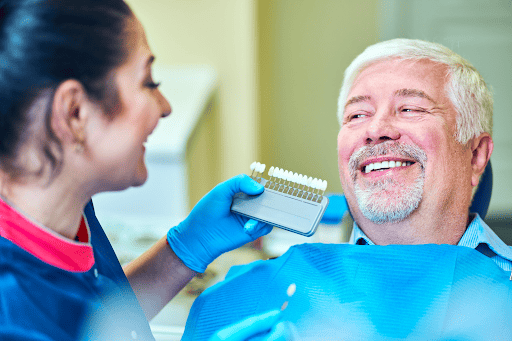Securing a radiant, healthy smile is a journey that goes beyond the dental chair. It’s why we can’t emphasise enough the paramount importance of dental implant aftercare. Once you’ve made the beneficial decision to enhance your smile with implants, it’s crucial that we don’t drop the ball on post-operative care. The steps you take following your dental surgery play an indispensable role in your dental surgery recovery. With diligent implant surgery aftercare, not only do we see you through to full recuperation, but we’re also committed to maintaining dental implants that seamlessly become a part of your radiant, ever-beaming smile.
Be aware of all the Implications related to Implant Surgery
Many patients consider only the initial price of implants, but there are multiple issues to consider. For more detail, visit our Implants page.
Understanding Dental Implant Surgery Aftercare
When it comes to securing a successful recovery following oral surgery, understanding and implementing the right aftercare for dental implants is absolutely vital. Our commitment to guiding you through this process is underpinned by our clear and knowledgable advice that targets seamless healing after the procedure.
The First 48 Hours After Getting Your New Dental Implants: Critical Care Steps
Following your dental implant surgery, we understand that you might feel uncertain about the best ways to care for your new smile. During the first 48 hours, managing discomfort properly, maintaining oral hygiene, following a soft food diet, and ensuring adequate rest is absolutely essential to your recovery. Let’s guide you through each step of the process.
Managing Discomfort and Swelling
Dealing with pain management after implants is usually your first concern. To minimise pain and reduce swelling post-surgery, we recommend over-the-counter medications like ibuprofen, as they act as both pain relievers and anti-inflammatories. Ice packs for dental surgery can be gently applied to the cheek area to control swelling. Always adhere to any personalised pain management plan your dentist prescribes.
Oral Hygiene: To Brush or Not to Brush?
Maintaining oral hygiene after implant surgery is crucial, but it’s important to be gentle. Start by cleaning dental implants carefully, avoiding vigorous brushing near the surgical site. We suggest soft-bristled brushes designed for brushing after dental surgery, alongside mouthwash for implants that is gentle and alcohol-free to prevent irritation. This dual approach ensures cleanliness while protecting your new implants.
Dietary Recommendations Post-Surgery
Your diet after oral surgery plays a significant role in the healing process. To avoid discomfort while eating with new dental implants, stick to a soft food diet for dental surgery. This includes foods like smoothies, soup, and mashed potatoes, which are not only easy on your implants but also provide the nutrition you need. Steer clear of hard, sticky, or extremely hot foods that could impact your recovery adversely.
Rest and Recovery: Your Checklist
We can’t overstate the importance of rest after oral surgery for proper dental surgery recuperation. Allow yourself plenty of downtime, and keep your head elevated to reduce swelling. Here is a recovery checklist to help you keep track of your healing time for dental implants:
- Take medication as directed by your dentist.
- Use cold packs to manage swelling for the first 24 hours.
- Maintain a gentle oral hygiene regimen.
- Consume a nutrient-rich diet with soft foods.
- Stay hydrated but avoid using straws.
- Keep physical activity to a minimum.
- Keep an eye on the implant site for any unusual changes.
- Follow your dentist’s recovery plan without deviation.
By prioritising these steps, you’ll be on the path to a swift and successful recovery.
Long-Term Aftercare for Lasting Results
Keeping your dental implants in top shape is an ongoing commitment. Dental implant maintenance is crucial for safeguarding the long-term health of your dental work. By following a thorough post-operative dental care routine, you’re not just protecting your dental investment; you’re ensuring that your implants last as long as possible. Let’s dive into some of the best practices for caring for implants long-term.

- Regular dental check-ups are your first defense against potential issues and play a critical role in maintaining oral health.
- Professional cleanings by qualified dental hygienists help prevent plaque build-up, which can affect your implant’s stability over time.
- Using the correct dental products is essential and we recommend specific brushes and cleansers that are gentle and excellent for implant care.
- Do not smoke, particularly during the healing process, as this can cause dry sockets.
It’s not just about the right habits, though. The tools and products you use matter immensely. Here’s a comprehensive list of recommended items tailored for dental implant care:
| Cleaning Tool | Purpose | Usage Frequency |
| Soft-bristle brush | Gentle cleaning of implant crown and surrounding gums | Twice daily |
| Low-abrasive toothpaste | To protect the implant surface integrity | Each brushing |
| Interdental brush | Cleaning hard-to-reach spots around implants | Daily |
| Unwaxed dental floss or floss for implants | Removing plaque between the teeth and implant | Daily |
| antimicrobial mouth rinse | Reducing bacteria and plaque to protect oral health | As recommended by dentist |
| Water flosser (optional) | Enhancing cleaning around implants, especially for those with dexterity issues | Daily or as needed |
Signs to Watch Out For: Complications and Implant Care
When we have undergone a procedure as significant as dental implant surgery, being vigilant during the recovery process is crucial. It’s normal to experience some discomfort and witness changes as our body heals, but spotting the difference between dental implant healing signs and potential complications is vital. While tenderness and slight swelling are expected, red flags like persistent pain, excessive bleeding, or pus must be addressed promptly to avoid infection after dental surgery or even recognise implant failure before it escalates.
Normal Healing vs. Warning Signs
Understanding the nuances of post-operative healing helps us ensure our oral health with implants remains uncompromised. The early stages will see some swelling and occasional discomfort; however, symptoms like severe throbbing pain, unusual discharge, or signs of infection after dental surgery indicate it’s time to seek emergency dental care. Timely intervention can prevent severe complications of dental implants and aid in successful recovery.

Maintaining Oral Hygiene with Implants
Our dental implant cleaning routine is paramount in avoiding post-surgery infections and maintaining the integrity of our implants. We’re advised to use implant-specific hygiene products, such as soft-bristled brushes, interdental brushes, and water flossers that cater to the needs of delicate post-surgical sites. Incorporating these tools into our daily regime is essential for fostering our oral health with implants, making certain that recovery is on track, and sustaining the long-term well-being of our new smile.
Partner with Bite Dental for Your Dental Implant Surgery
Ifyou’re ever in doubt about the sensations you’re experiencing, or if you detect any symptoms deviating from the normal healing trajectory, it’s important to contact your dentist without delay. Dental implant follow-up appointments are pivotal in tracking our progress and should be adhered to for comprehensive post-surgical dental support. At Bite Dental, we’re here to guide you through every step of your journey, assuring you that your smile is not only aesthetically pleasing but also a testament to robust health. Give us a call at 07 3221 5399 or check out our website. When you get your dental implants with Bite Dental, you guarantee yourself a commitment to exceptional care at every step, even after your surgery.


